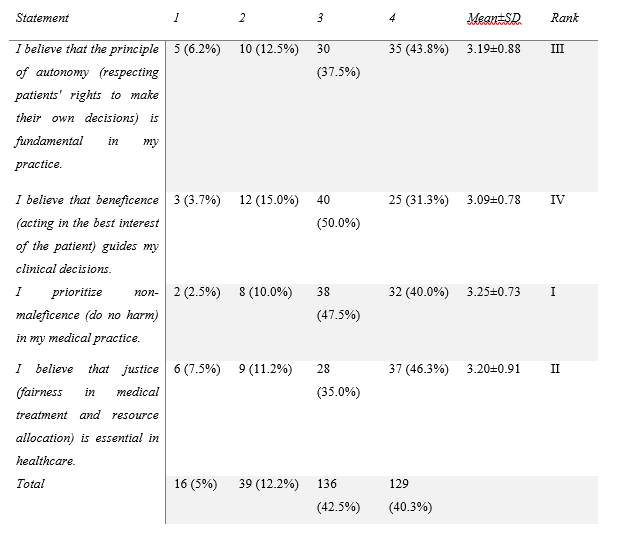PERCEPTIONS OF MEDICAL ETHICS AND PROFESSIONALISM AMONG PRACTICING PHYSICIANS OF AZAD JAMMU AND KASHMIR: A MIX-METHOD STUDY OF ETHICAL DILEMMAS
Keywords:
Business Models, Emerging Markets, Market Research, Local Partnerships, Innovation Strategies, Competitive Edge, Case Studies, Strategic Considerations, Economic Environment, Cultural Adaptation.Abstract
Background: The evolving nature of clinical practice, patient interactions, and advancements in medical technology may influence how practicing physicians perceive and apply medical ethics and professionalism. Aim: Therefore, this study assessed how factors such as experience, specialization, and frequency of ethical dilemmas and modern challenges shape physicians' views on ethics and professionalism. Methodology: A mix-method survey-based study was conducted among practicing physicians in Azad Jammu and Kashmir using stratified random sampling. Data were collected through self-administered questionnaire assessing perceptions of medical ethics and professionalism. Results: The demographic distribution showed that participants were evenly split between the 31-40 and 41-50 age groups (30% each), with males comprising 50% and females 40% of the sample. Most had 2-5 years (30%) of practice. General practitioners made up 30% while hospitals were the most common workplace (45%). The study found that physicians ranked non-maleficence (mean = 3.25) as the top ethical principle. There were notable links between medical specialty and views on non-maleficence, and between years of practice and both autonomy and non-maleficence. Common ethical dilemmas included patient confidentiality (68.8%) and informed consent (62.5%). Although 75% of physicians received ethics training during medical school, only 43.8% engaged in ongoing ethics-focused professional development. Key challenges included managing conflicts of interest, addressing cultural and religious sensitivities, and handling unethical behavior by colleagues. Conclusion: In conclusion, physicians prioritized non-maleficence, with significant links between years of practice, medical specialty, and ethical views. Future research should explore how targeted ethics training can further enhance ethical decision-making across specialties.
Downloads

Downloads
Published
Issue
Section
License
Copyright (c) 2024 Sundus Khalid, shingraf waseem, Poshmal Zahid, Saqib Zaheer, Rizwan Ahmed, Matee Ullah, Aqib Sajjad (Author)

This work is licensed under a Creative Commons Attribution 4.0 International License.


